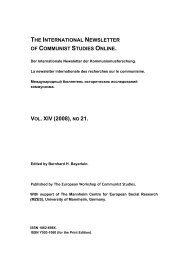11RXNdQ
11RXNdQ
11RXNdQ
Create successful ePaper yourself
Turn your PDF publications into a flip-book with our unique Google optimized e-Paper software.
The Political Thought of Patrice Lumumba* 95<br />
évolué hid the truth: a small privileged class regarded itself as the vanguard of the<br />
colonized. Everything conspired to deceive Lumumba: in August 1956, the évolués’<br />
demands were supported unanimously by the delegates at the general assembly of the<br />
APIC. 3 He saw in this agreement between the masses and the elite a sign of the profound<br />
unity of the Congolese. In the light of events, we now see that it was an abstract entente:<br />
the indigenous masses were proud of their ‘évolués’ who proved for everyone that blacks,<br />
provided they were given the opportunity, could equal or surpass whites; they supported<br />
the demands of the privileged elite – mainly in word and applause – because they saw in<br />
them a radical stand of the exploited against the employer. It was an example and a<br />
symbol; from this, the delegates could envisage a radicalization of the workers’ demands.<br />
But when circumstances produced this, its effect was abruptly to break up the alliance<br />
between the masses and the petty bourgeoisie.<br />
Lumumba was mistaken about this, but this inevitable error did have positive<br />
consequences; in short, he was right, historically, to make it. It was that which enabled<br />
him to assert with so much force that unity alone would allow the Congo to gain<br />
independence. This formula, so often repeated, is nevertheless perfectly correct provided<br />
that one adds that the unitary movement should come from the base and flood the country<br />
like a tidal wave. Unfortunately for the Congo, social divisions, the timidity of the<br />
demands and the absence of a revolutionary apparatus springing from the masses and<br />
controlled by them made, and continue to make, such a flood<br />
3 APIC: Association of Indigenous Personnel of the Colony.<br />
impossible. That will be the history of the next decade. Lumumba, listened to everywhere<br />
with enthusiasm, had reason to believe that the masses would follow the évolués all the<br />
way. This unity, which he considered to be both already realized and still to be created –<br />
half means, half supreme end – was in his eyes the Nation itself. The Nation: the Congo<br />
becoming unified through its struggle for independence. But the future prime minister<br />
was not naive enough to believe that this unification would occur spontaneously. He<br />
simply stated this negative principle: as the Administration divides and rules, the only<br />
way to cause it to lose its power is to remove everywhere the divisions that it has created.<br />
Tribalism had to go, along with the provincialism, the artificial conflicts and the watertight<br />
barriers that it maintained. Democracy, yes, but it should not be confused – as it was<br />
by Ileo – with federalism. Whatever the intention, however minimal the regional<br />
autonomy demanded by a party may be, federalism is the bad apple, it rots everything<br />
and imperialism immediately exploits it. Lumumba understood that Abako would for a<br />
while be a remarkable tool for overturning colonialism, but that autonomy would later<br />
prove the best instrument for restoring it. His work as a postman integrated him into the<br />
colonial Administration and enabled him to discover its principal characteristic:<br />
centralization. This discovery was all the more easy for him because chance made him a<br />
cog in the centralized communications system. The Post Office network extended into all<br />
the provinces and even into the bush; through it, the government’s orders were relayed to<br />
the local gendarmeries and the Force Publique. If one day the Congolese Nation were to<br />
exist, it would owe its unity to a similar centralism. Patrice dreamed of a general uniting<br />
power which would apply everywhere, impose harmony and a community of action




